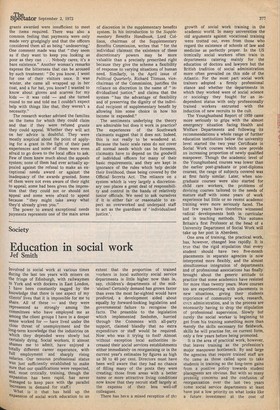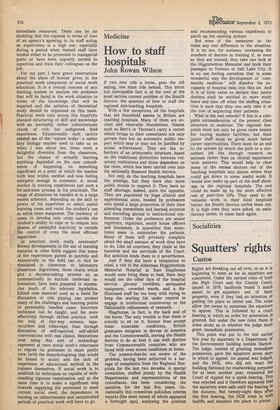Society
Education in social work
Jef Smith
Involved in social work at various times during the last ten years with miners on the fringe of Edinburgh, with railwaymen in York and with dockers in East London, I have been constantly nagged by the knowledge that there is one aspect of my Clients' lives that it is impossible for me tO Share, All of these — and they were represented as strongly among the Committees who have employed me as among the client groups I have in a deeper sense worked for — have lived under the Close threat of unemployment and the long-term knowledge that the industries on Which they depended were slowly but certainly dying. Social workers, it almost shames me to admit, have enjoyed a totally different career experience, with full employment and sharply rising salaries. Our tenuous professional status Was just sufficiently established to make sure that our qualifications were respected, and, most critically, training, though the expansion has been rapid, has never managed to keep pace with the parallel Increases in demand for staff.lot1,
What is it that has he up the expansion of social work education to an extent that the proportion of trained workers in local authority social service departments is little higher now than in, say, children's departments of the mid'sixties? Certainly demand has grown faster than even the most far-sighted would have predicted, a development aided about equally by forward-looking legislation and governmental failure to recognise the facts. The preamble to the legislation which implemented Seebohm, hurried through the Commons with all-party support, claimed blandly that no extra expenditure or staff would be required. Now who was it trying to fool? Almost without exception local authorities increased their social services establishments either immediately on reorganising or in the current year's estimates by figures as high as 30 to 40 per cent. Directors must have been well aware that they had no chance of filling many of the posts they were creating; those from areas with a better name or more attractive living conditions now know that they recruit staff largely at the expense of their less well-off colleagues.
There has been n a mixed reception of th:. growth of social work training in the academic world. In many universities the old arguments against vocational training were trotted out, even from those who regard the existence of schools of law and medicine as perfectly proper. In the US ironically social workers often train in departments catering mainly for the education of doctors and lawyers but the British tradition of social administration more often prevailed on this side of the Atlantic. For the most part social work trainers adopted a firmly professional stance and whether the departments in which they worked were of social science or sociology they fought for an independent status with only professionally trained workers entrusted with the induction of new recruits to the cult.
The Younghusband Report of 1959 came more seriously to grips with the almost emergency situation facing Health and Welfare Departments and following its recommendations a whole range of further education institutions below the university level started the two year Certificate in Social Work courses which now provide an increasing proportion of newly qualified manpower. Though the academic level of the Younghusband courses was lower than the earlier post-graduate or post-diploma courses, the range of subjects covered was at first fairly similar. Later, when nongraduate courses were also started for child care workers, the problems of devising courses tailored to the needs of mature staff with some years of work experience but little or no recent academic training were more seriously faced. The last few years have therefore witnessed radical developments both in curricular and in teaching methods. This autumn Britain's first Professor at the head of a University Department of Social Work will take up her post in Aberdeen.
One area of training, the practical work, has, however, changed less rapidly. It is true that the rigid stipulation that every student should have two five-month placements in separate agencies is now interpreted more flexibly, and the almost simultaneous integration of departments and of professional associations has finally brought about the generic attitude to practice that some academics have resisted for more than twenty years. More courses too are experimenting with placements in new situations, giving their students experience of community work, research, cvcn administration, and in the process are necessarily having to drop the stipulation of professional supervision. Slowly but surely the social worker is beginning to get from his training something more than merely the skills necessary for fieldwork. skills he will practise for, on current form, only a few years before being promoted.
It is the area of practical work, however, that leaves training as the profession's major manpower bottleneck. By and large the agencies that require trained staff are the same as those called upon to take students in training so the long-term gains from a positive policy towards student placements are obvious. But with so many pressing concerns and the confusion of reorganisation over the last two years some social service departments at least have put a low priority on what looks like a future investment at the cost of immediate resources. There can be no doubting that the expense in terms of time of an agency's agreeing to its staff acting as supervisors is a high one, especially during a period when trained staff have tended either to be promoted to managerial posts or have been urgently needed to supervise and train their colleagues on the job.
For my part I have grave reservations about the place of honour given to the practical work component of social work education. It is a central concern of any training system to analyse the problems that will be faced in the work situation in terms of the knowledge that will be required and the syllabus of theoretical study should be organised on this basis. Practical work cuts across this hopefully planned structuring of skill and knowledge with an inevitably rather indiscriminate chunk of rich but undigested field experience. Educationally such tactics remind me of the 'nature walks' a rather lazy biology teacher used to take us on when I was about ten; these were a delightful diversion from the classroom, but the chance of actually learning anything depended on the rare coincidences of happening on something significant at a point at which the teacher both was within earshot and was feeling energetic enough to comment. A social worker in training experiences just such a hit-and-miss process in his practicals. The range of situations he handles is to a large extent arbitrary, depending on the skill or power of his supervisor to select useful learning cases and resist the student's use as extra tame manpower. The tendency of cases to develop into crisis outside the student's ability to cope or to relapse into phases of unhelpful inactivity is outside the control of even the most efficient supervisor.
Is practical work really necessary? Recent developments in the use of learning material in other fields suggest that many of the experiences gained so patchily and expensively in the field can in fact be simulated in classroom or laboratory situations. Algorithms, those charts which plot a decision-taking process so as systematically to exclude irrelevant information, have been prepared to summarise much of the relevant legislation. Edited case material used as a basis for discussion or role playing can present many of the challenges and learning points of personality handled cases. Interview technique can be taught, and far more effectively through skilled practice with the help of two-way screens, tape.
recorders and video-tape, than through discussion of self-reported, self-edited conversations with real clients. Hesitations over using this sort of technology represent at once social work's reluctance to expose its processes to more public view (with the demythologising that would be bound to occur) and the lack of experience of educational method in the trainers themselves, If social work is to establish its techniques as capable of with standing rigorous examination and at the same time is to make a significant step towards supplying the personnel to meet current social need, the dependance in training on indiscriminate and uncontrolled periods of practical work will have to go.







































 Previous page
Previous page